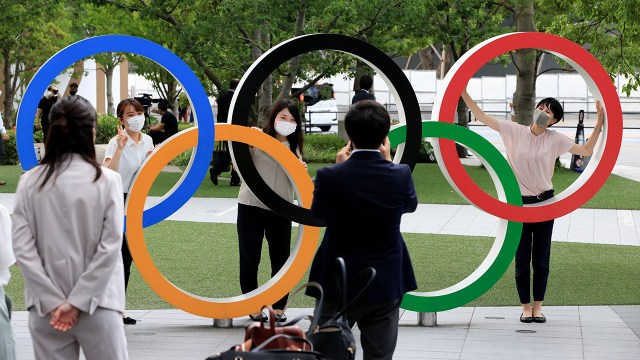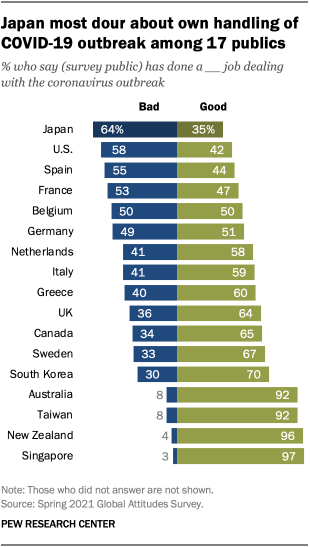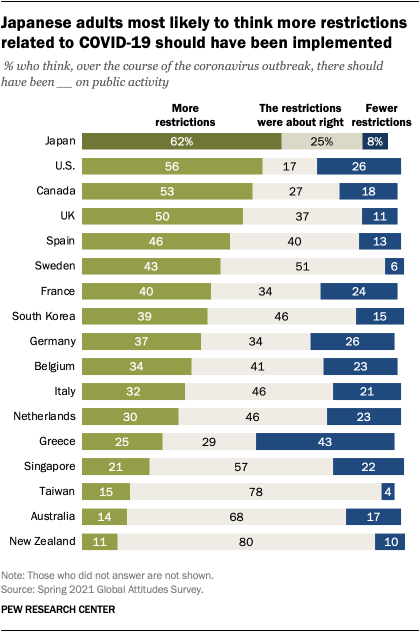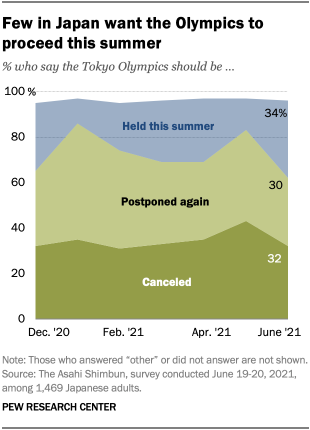
After postponement of the 2020 Tokyo Olympics last year due to the coronavirus pandemic, the Games appear on track to proceed in Japan this week despite an increase of COVID-19 cases in the country since May. A Pew Research Center spring survey shows most Japanese adults disapprove of how their country has handled the pandemic thus far. At the same time, domestic polls show the Japanese public does not think the Games should proceed this summer.
Among all 17 publics included in the Center’s spring 2021 survey, those in Japan report the most negative assessment of how their country has handled the pandemic. More than six-in-ten Japanese adults (64%) say Japan has done a bad job dealing with the coronavirus outbreak.
The next-most negative reviews of how their own countries handled the pandemic come from Americans (58%) and Spaniards (55%). Among the five other publics surveyed in the Asia-Pacific, majorities rate their own handling of the pandemic as good. In fact, about half or more in New Zealand, Singapore, Australia and Taiwan rate responses where they live as very good. In Japan, just 4% say the country did a very good job handling the pandemic.
Japan stands out from other publics surveyed when it comes to the relationship between their ratings of the country’s response to the pandemic and the country’s number of COVID-19-related deaths. The Japanese generally gave less positive responses about their pandemic performance than other publics even though Japan had fewer deaths relative to others who voice similar levels of dissatisfaction.
This Pew Research Center analysis focuses on public attitudes toward the COVID-19 pandemic in Japan and 16 other advanced economies in North America, Europe and the Asia-Pacific. For non-U.S. data, the report draws on nationally representative surveys of 16,254 adults from March 12 to May 26, 2021, in 16 publics (including March 16-April 26 in Japan). All surveys were conducted over the phone with adults in Canada, Belgium, France, Germany, Greece, Italy, the Netherlands, Spain, Sweden, the United Kingdom, Australia, Japan, New Zealand, Singapore, South Korea and Taiwan.
In the United States, we surveyed 2,596 U.S. adults from Feb. 1 to 7, 2021. Everyone who took part in this survey is a member of the Center’s American Trends Panel (ATP), an online survey panel that is recruited through national, random sampling of residential addresses. This way nearly all U.S. adults have a chance of selection. The survey is weighted to be representative of the U.S. adult population by gender, race, ethnicity, partisan affiliation, education and other categories.
This study was conducted in countries where nationally representative telephone surveys are feasible. Due to the coronavirus outbreak, face-to-face interviewing is not currently possible in many parts of the world.
To account for the fact that some publics refer to the coronavirus differently, in South Korea, the survey asked about the “Corona19 outbreak.” In Japan, the survey asked about the “novel coronavirus outbreak.” In Greece, the survey asked about the “coronavirus pandemic.” In Australia, Canada, New Zealand and Taiwan, the survey asked about the “COVID-19 outbreak.” All other surveys used the term the “coronavirus outbreak.”
Here are the questions used for the report, along with responses. See our methodology database for more information about survey methods outside the U.S. For respondents in the U.S., read more about the ATP’s methodology.
The Asahi Shimbun poll contacted Japanese adults via both landline and mobile phone numbers selected at random by computer between June 19-20, 2021. The final sample includes 1,469 interviews of eligible voters, with 41% coming from landlines and 59% coming from mobile phones.
Differences exist in Japan when it comes to party affiliation and overall views of how the country handled the pandemic. Those who feel closest to Prime Minister Yoshihide Suga’s Liberal Democratic Party (LDP) are more likely than those who don’t feel close to any particular party to say Japan has done a good job handling the coronavirus outbreak (50% vs. 30%, respectively). These views may take on more significance if Suga calls a snap election after the Olympic and Paralympic Games conclude. (Not enough respondents feel closest to Komeito or the Constitutional Democratic Party to compare in this analysis.)
Japanese adults also critique the approach their nation has taken more than other publics when it comes to restrictions on social activities during the pandemic. About six-in-ten (62%) voice the opinion that there should have been more restrictions on public activity throughout the course of the pandemic, the highest share to say so among all 17 advanced economies surveyed. A quarter think the level of restrictions they experienced were about right, and just 8% would have liked fewer restrictions.
As with overall views of the pandemic response, party affiliation relates to how one views COVID-19 restrictions. About two-thirds (66%) of those who do not feel close to any political party think there should have been more restrictions, versus 56% of those who most identify with Japan’s ruling LDP, a 10 percentage point difference. And though a minority of LDP supporters think the level of restrictions is about right (30%), they are more likely to hold this opinion than the unaffiliated (21%).
In other publics throughout the Asia-Pacific, such as New Zealand, Taiwan and Australia, more than two-thirds voice contentment with the levels of restrictions imposed during the pandemic.
Attitudes about Japan’s response to the pandemic mirror attitudes about proceeding with the upcoming Olympic Games, slated to start on July 23. According to a June poll from the Japanese newspaper The Asahi Shimbun, 32% of eligible voters in Japan want to see the Games completely canceled, and an additional 30% would prefer another delay. Roughly a third (34%) want the event to proceed as scheduled this summer, which is a 20-point increase from when the same question was asked a month earlier. Some of this hesitancy is rooted in safety concerns: More than eight-in-ten (83%) say they would feel unsafe with the Olympics continuing as planned in Tokyo.
The Japanese government has also weighed various options regarding spectators (or lack thereof) at the Games, with organizers first deciding to limit attendance to 10,000 local fans before largely banning spectators altogether. The June Asahi Shimbun survey shows public opinions for these measures before they were announced, with 53% of eligible Japanese voters preferring no spectators at all and 42% favoring a limited number of fans in the stands.
Note: Here are the questions used for the report, along with responses, and our U.S. methodology and international methodology.





